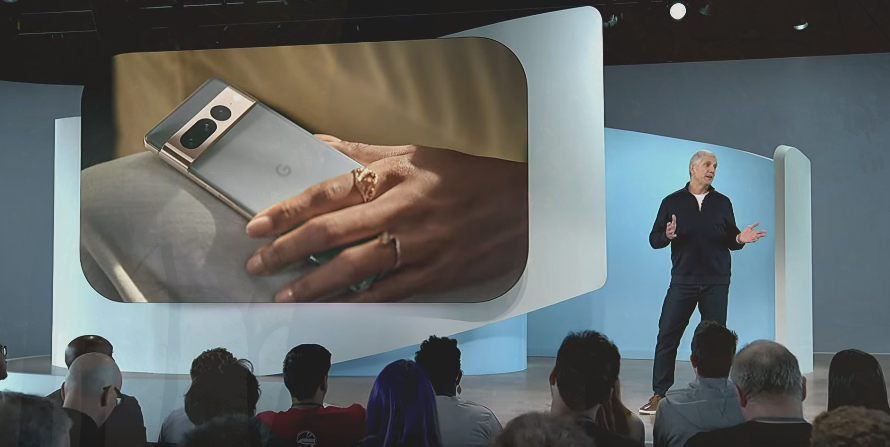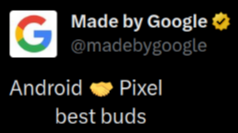The wait is over Pixel fans!
Google held its Pixel launch event today where they announced the new Pixel 8 and 8 Pro phones and the Pixel Watch 2. You can watch watch the full keynote here: https://www.youtube.com/watch?v=pxlaUCJZ27E (Invidious link: https://inv.zzls.xyz/watch?v=pxlaUCJZ27E) but below you'll also find a quick write-up I was able to do about the event for those who don't have the time to watch it. Don't hesitate to mention in the comments anything I might have missed!
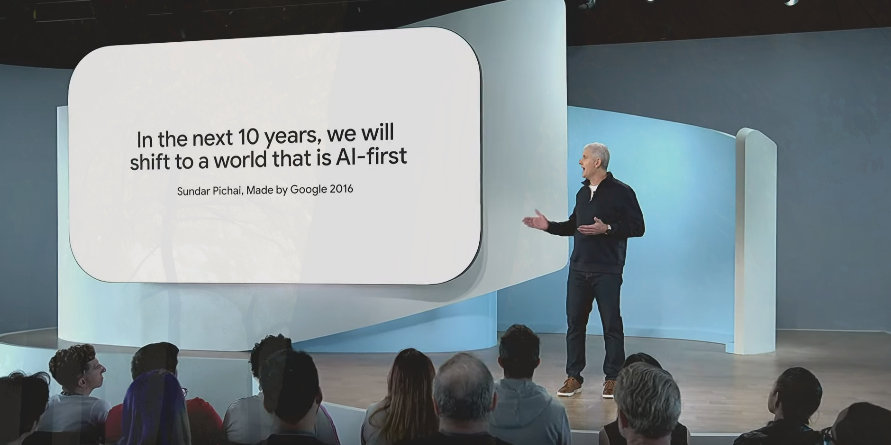
Rick Osterloh, SVP of the Devices & Services division at Google, kicked off the keynote by emphasizing the company's AI achievements as AI will also be a recurring theme in the entire keynote. He highlighted some of the AI features and developments that were integrated into Pixel phones, like Call Screen, Magic Eraser, Photo Unblur, Night Sight and the Google Tensor chip.
Rick also claims that the Pixel was the fastest-growing smartphone in (their) top markets and the only one that grew in units sold year-over-year (they cite IDC and restrict to phones with MSRP above $300), calls the AI features of the Pixel Camera, such as Night Sight, Active Stabilization, Real Tone, the biggest breakthrough in mobile computing.
He also mentions that an update is going to be rolled this week to the Pixel Buds Pro that will have:
- Improved Clear Calling;
- Bluetooth Super Wideband support for higher bandwidth and better quality;
- Automatic Transparency Mode when you need to talk to someone;
- Reduced latency by up to 50%
(pretty cool, less e-waste as your existing Pixel Buds Pro just got better)
The Pixel Fold software is also getting an update as it's going to have "Dual-screen Interpreter Mode".
Some Google Home experimental features are also going to be rolled out next year:
- Quick Home Highlights to get a quick AI-generated summary of what happened at home;
- Ability to ask about your home in natural language (e.g. "did my package arrive?").
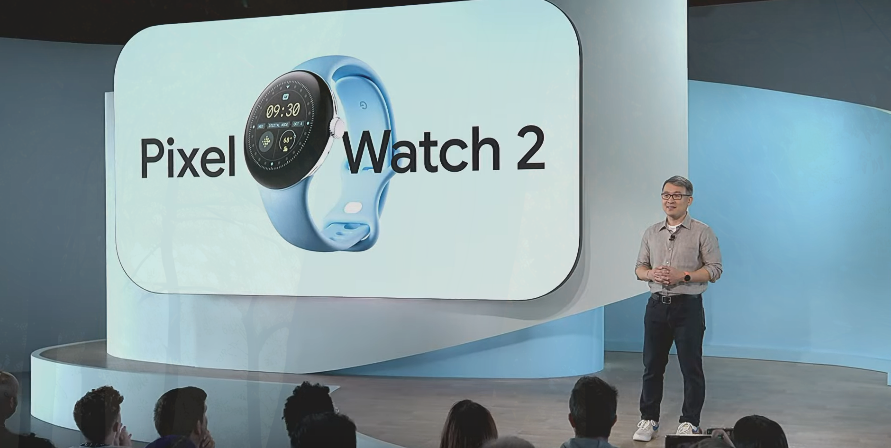
James Park, Fitbit co-founder and now VP and general manager of Google Wearables, then enters the scene. He introduces the Pixel Watch 2 and the improvements it comes with:
- upgraded design and materials: more durable cover glass and recycled aluminum housing, more breathable sports design, updated watch faces and bands, 1st gen bands still fit;
- faster quad-core CPU;
- battery life: 24 hours of use on a single charge with always-on display;
- gets a 12 hour charge in 30 minutes;
- WearOS 4 new apps: Gmail, Calendar, improvements to YouTube music, Maps and Google Assistant;
- emergency real-time location sharing;
- safety check: you basically set a timer and if you don't check in after the time expires it will share your location with your emergency contacts (won't need an LTE connection if you have Fitbit Premium);
- "three new sensors, 10x more optical channels" that can measure the heart rate, "40% more accurate" heart rate tracking using ML algorithms;
- stress monitoring and suggestion of stress relief measures;
- to be rolled out next year with priority access for Pixel phone owners: "Personal AI" in the Fitbit app that can pair the different data about you to answer questions like "today's run felt harder than usual, how does it compare with my previous runs";
- comes in WiFi and LTE version, pricing starts at $349.
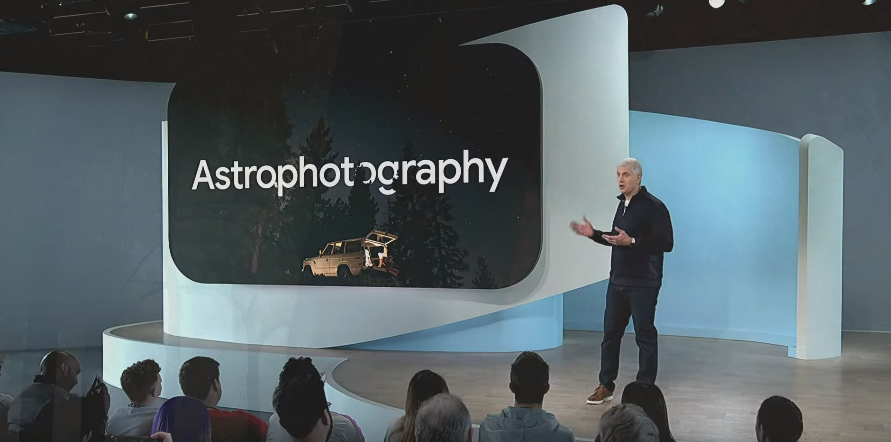
Rick now gets briefly back to the stage to hype a bit more the Pixel 8 and 8 Pro phones, before giving the stage to Claude Zellweger, director of Design at Google, who praises the rounder design, matte glass finish, new colors and how it's natural to hold due to its smaller size.
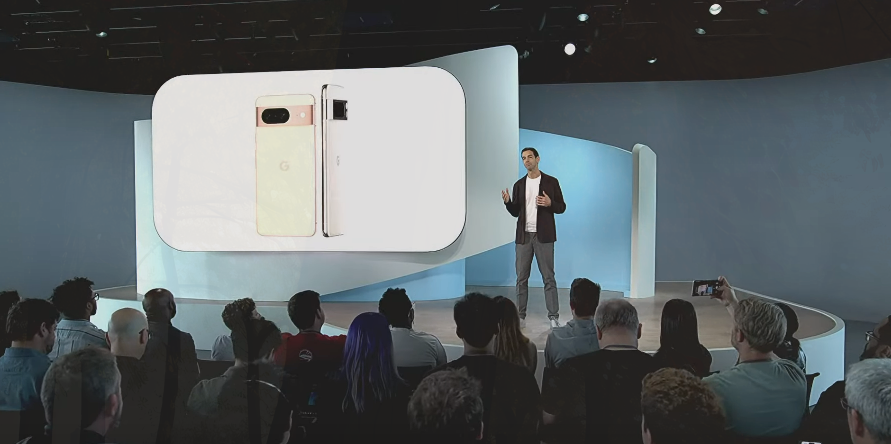
It's interesting how they're talking about longevity as a selling point by highlighting how "it's easier to repair" and their partnership with iFixit. Other novelties he mentions:
- Actua Display on Pixel 8: 6.2″, 2000 nits peak brightness and 60-120Hz refresh rate;
- Super Actua Display on Pixel 8 Pro: 6.7″, 2400 nits peak brightness, refresh rate that adjusts "intelligently" between 1 and 120Hz;
- New temperature sensor;
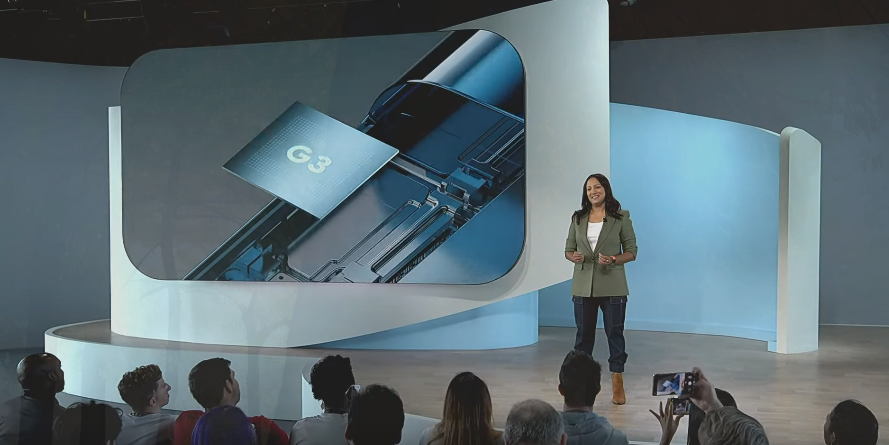
Monika Gupta, product manager at Google, now takes the stage to talk about the Google Tensor G3. It's interesting that they're comparing the ML/AI capabilities to the Pixel 6 and not the Pixel 7. She claims that the Pixel 8 runs twice as many machine learning models as the Pixel 6 (awkward wording, she likely meant that more AI features are available on the Pixel 8 and probably wanted to highlight that the G3 is now powering AI on many more aspects of your phone). She claims that the most complex model on the Pixel 8 is 10x more complex (larger?) than the most complex model available on the Pixel 6 (again an awkward comparison, because it doesn't necessarily mean that the Pixel 6 can't run more complex models than it currently has). Very weird way to sell the G3. She also claims more AI concurrency with the G3.
Monika also shows off some small AI updates, like speech-to-text with automated language detection, the ability to have the phone read an article and fast-forward or read it in another language, and rehashes AI features which we already have in the previous Pixel phones. Call Screen to come to Pixel Watch and Pixel Watch 2 later this year (will require a Tensor-powered Pixel phone).
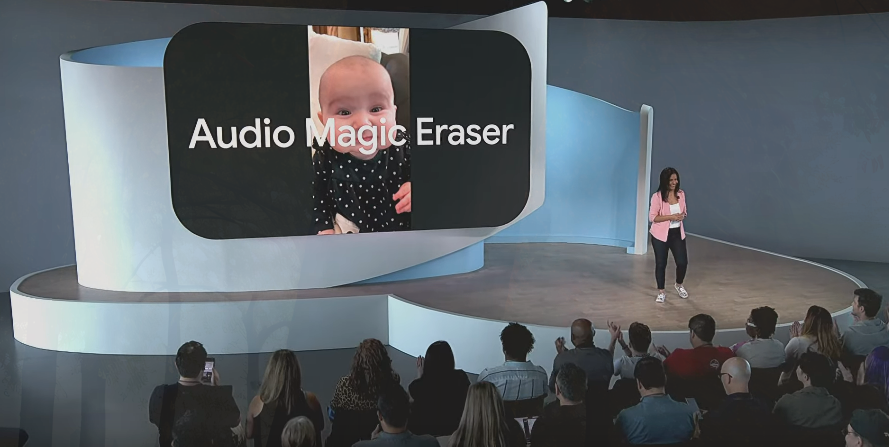
Monika then yields the floor to Shenaz Zack, also a product manager at Google, who will talk about:
- the new Pixel 8 camera: fully upgraded ultra-wide and new 50MP wide camera capable of producing "2x optical-quality images with even better low-light performance", improved video capabilities (4K video, 24/30/60fps), faster auto-focus;
- Magic Audio Eraser: basically like Magic Eraser but for audio, see https://lemmy.world/post/3054188;
- Best Take: combining multiple shots to show everyone with the "best" facial expressions;
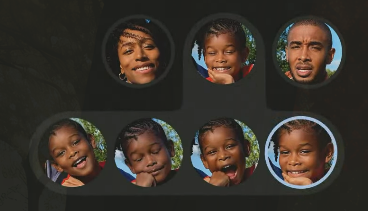
- Magic Editor in Google Photos: ability to resize, move or remove objects in a photo with a few taps;
- Guided Frame: helps blind people take photos by taking hints from the environment.
She then switches to the Pixel 8 Pro camera:
- 50MP main sensor, 48MP ultrawide lens, 48MP telephoto;
- auto-focus on the front camera;
- new "Pro Controls" for "photographers who want total creative control over the camera": ISO sensitivity, shutter speed, lens selection, focus, ability to take 50MP photos from across the zoom range with the raw images preserving HDR+ adjustments;
- Video Boost: HDR+ and Night Sight videos by taping into Google's datacenters (obvious privacy concerns here, but the sample night sight video they showed is simply stunning!), going to come as a feature drop in December;
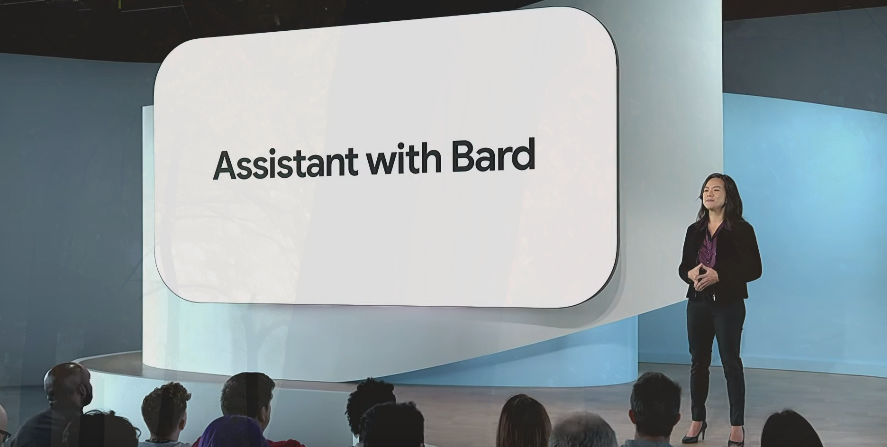
Sissie Hsiao, VP and general manager for Assistant and Bard at Google, now takes the floor to talk more about generative AI. After a brief presentation of Bard, she introduces Assistant with Bard which as its noun suggests basically combines Bard with Google Assistant.
Rick comes back for a few final highlights:
- the Pixel 8 can generate summaries of web pages by tapping a "summarize" button;
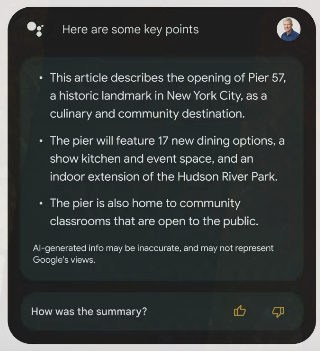
- Pixel 8 Pro can run generative AI with "150x more computations than the largest model on the Pixel 7", leading to among other things a better Magic Eraser;
- Recorder is going to be able to summarize your recordings (Pixel 8 Pro, coming in December);
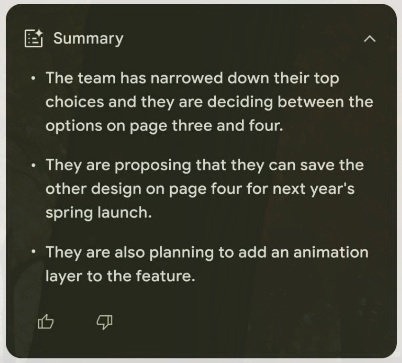
- Automated smart replies in Gboard using an LLM (Pixel 8 Pro, coming in December);
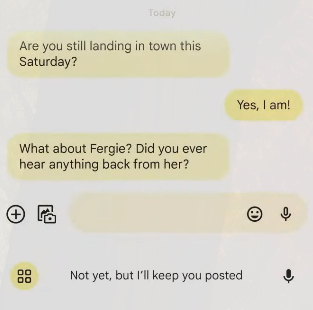
- Zoom Enhance: basically upscaling (Pixel 8 Pro, coming in December);


- 7 years of OS & security upgrades and feature drops.
Pricing will start at $699 for the Pixel 8 (comes with the Pixel Buds Pro) and $999 for the Pixel 8 Pro (comes with the Pixel Watch 2).
